As I made my way into the Bell Center in Montreal on Nov. 26, I was thinking about the possible scene happening in the Montreal Canadiens’ dressing room. The tension was probably a little higher, it might have been a bit quieter than normal. Surely, every player was fully focused, taping their sticks and going through their respective pre-game rituals while thinking about their matchup against the Boston Bruins, one of the top teams in the NHL at this stage of the season. The music might have been a little less loud than normal, jokes and banter a little more subdued.
What is normally a situation of controlled chaos in the moments before jumping on the ice now becomes more intense and more apprehensive when it happens in the context of a slump. The Canadiens are going through their worst winless streak of the season having lost their previous four games.
The haunting memory of their disappointing and “unacceptable” loss against the New York Rangers on Nov. 23 is still fresh in everyone’s mind. The team wasted a 4-0 lead and allowed three unanswered goals in the third period to lose 6-5. The shock of the loss among fans is only equaled by the myriad of questions coming from a sports media environment hungry for tantalizing soundbites. As a result, the team is now populated by a group of nervous players unsure of their abilities.
Also, the overall situation of the team is eerily similar to last season when a late November slump darkened postseason prospects. Fans recall too well that the Canadiens missed the playoffs in 2018-19 by two points.
Watching the pre-game warmup, many thoughts were racing through my mind. The contrast between the teams was already striking, possibly a sign of what was coming later in the evening. On one side of the ice was a unit functioning in a similar fashion to a high-performance engine with all cylinders smoothly revving. Sitting among the top teams at the summit of the standings, the players worked through their standard skating, shooting and passing drills effortlessly and with assurance. On the other side, a tense team searching for its game, desperately seeking to rediscover a path to victory.
The scene made me wonder about the reasons why the Habs have been slipping of late. What is the cause? More importantly, however, I asked myself whether the team currently has the right elements to get back on the winning track. Would the Canadiens use the motivation and energy that comes from a confrontation against a long-standing rival to correct its perilous course? Here is what I came up with.
First Line Woes
The first line comprised of Phillip Danault, Brendan Gallagher and Tomas Tatar has not been playing like an NHL top line. The problems are not only on the offensive side – but the trio has also become somewhat of a defensive liability. Collectively, they have only contributed a total of six points and are minus-10 in the last four games leading up to the matchup against the Bruins. Of the three linemates, Tatar is the worst offender at minus-six.
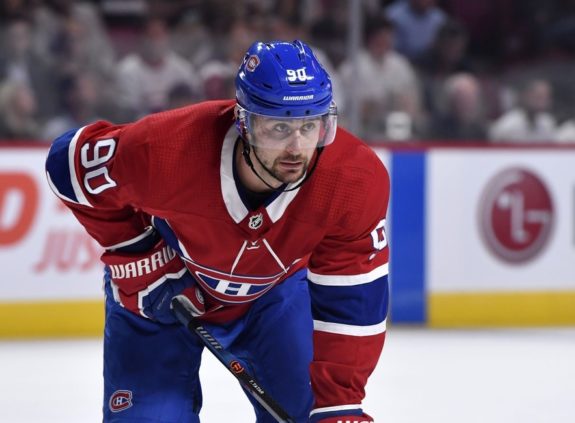
Clearly more is expected from a line that should be setting the tone for every game. Gallagher’s trademark intensity is absent. The sparks that would lead to the proverbial dirty goals, at the earlier stages of the season, seem to have disappeared in recent games.
Focus and Discipline Lacking
There exists an abundance of statistics that are available to the coaching staff, media and other detail-oriented observers that allow for a relatively precise assessment of an individual player’s or team’s on-ice performance. However, in some cases, it is through the close observation of subtle signs and clues that a more compelling story emerges. In the case of the Canadiens, there are four aspects of the team’s play that are particularly worthy of mention and indicative of a breakdown in the mental aspect of their game.
First, since the beginning of the season, the Canadiens have demonstrated that they can win against the best teams in the NHL. The St. Louis Blues, Boston Bruins, and Washington Capitals are some of the teams that the Canadiens have given fans the hope that they are competitive with anyone in the league. However, against weaker teams, the Canadiens have shown less resiliency and, for some reason, lower the intensity of their play. The critical end result is lost points in the standings.
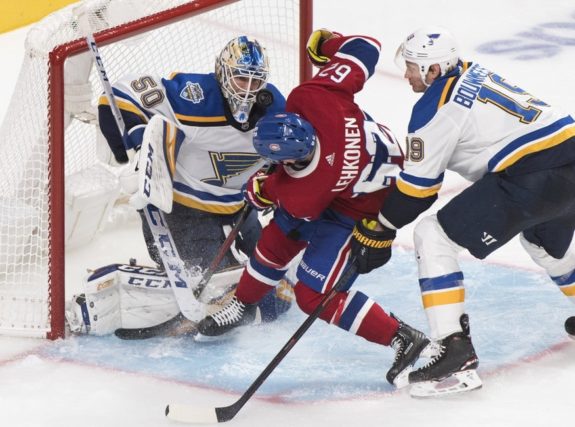
Second, the Canadiens have a tendency to give up leads in games. While the loss against the Rangers is the most dramatic thus far, in many cases the team cannot hold on to the slimmest of goal advantages. In fact, with the lead after the first period, the Habs have a record of 6-1-1. When they hold the lead after two periods, their record is 6-1-2. Some might consider this observation to be somewhat on the margin of determining a team’s overall performance picture. Perhaps, but the lost points in the standings emanating from these situations become a critical impediment to qualifying for the playoffs.
The previous point ties in seamlessly to the third aspect – giving up goals early or late in periods. Allowing a goal in such critical points of a game ultimately creates momentum shifts that, in many cases, can alter the final outcome. Who is to blame in these circumstances? Is it a lack of focus on the part of one particular player or is it due to a team-wide breakdown in its attention to detail and discipline? While playing to the horn or starting as soon as the puck drops are obvious aspects of a professional hockey team’s game plan, these might need to be forcefully emphasized on the whiteboard in the Habs dressing room.
Finally, when the opposing team scores first, the Canadiens have only won one game. This is another indication, in line with the others described here, that is indicative of the team’s mental fragility. Unlike the situation early in the season when the team almost relished a come-from-behind scenario to win games, giving up an early lead now appears to be terminally detrimental to a successful outcome.
A Very Small Bright Spot
As a result of the injuries to Jonathan Drouin and Paul Byron, and the requisite line juggling by Claude Julien, the line comprised of Max Domi, Nick Suzuki, and Artturi Lehkonen appears to be a promising bright spot. It was the best Canadiens line on the ice against the Rangers scoring four of the team’s five goals.
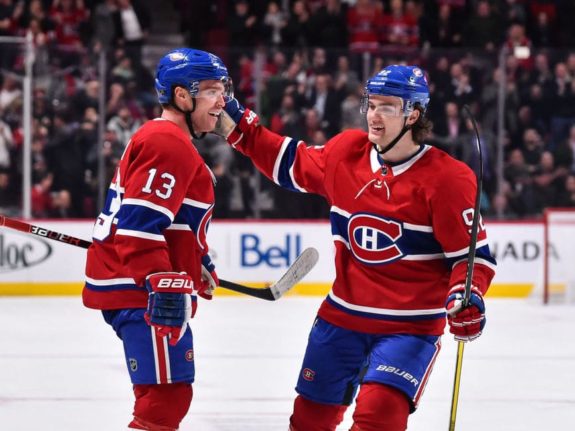
While the performance during one game does not make a particular line combination mathematically sustainable, it does indicate that Julien will need to be creative in his problem-solving. Finding the right permutations could be a catalyst to get the team out if its pre-winter funk. But will that be enough?
An Issue of Depth
One might have thought that the embarrassing loss against the Rangers would have justified a full collective effort by a team that was looking for an important bounce-back win on home ice. Also, the trend of success against stronger teams offered a glimmer of hope to fans that the slump would end when confronted with a stronger opponent. It did not.
The Canadiens were embarrassed by the Bruins who humiliated them with a score of 8-1. It is back to the drawing board for head coach Claude Julien. The outcome of the game was a concerning indication that the challenges facing the Canadiens might be more significant than anticipated. It cannot be solely accounted for by the injuries to two veteran forwards. There is something deeper at play.
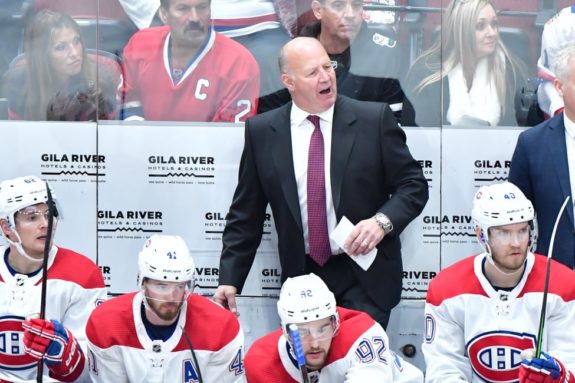
Maybe the early successes this season were but an illusion of the true capabilities of what this team can accomplish. This is where the debate as to what is required to fix the situation will heat up considerably. The issue of the team’s depth will be at the forefront of very animated discussions.
With the winless streak now at five games, there is increasing polarization within the media and among fans. The pressure will continue to mount for something dramatic to happen with the roster if it cannot happen on the ice.
Cue in the role of general manager Marc Bergevin. Upset fans and bombastic sports journalists often like to point toward the general manager of the team to find the on-ice solutions. However, in many cases, the suggestions are unrealistic. Who doesn’t want a large top-six forward or a puck-moving defenseman? Unfortunately, the performance of the team’s backup goalie is also generating unexpected feedback and suggestions for an alternative. The demand for external help in the form of a trade will grow increasingly louder if the drought continues.
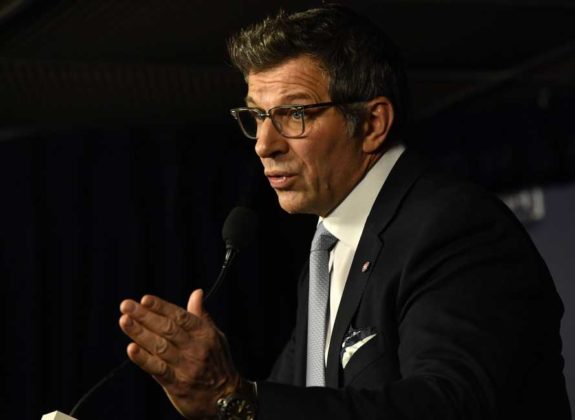
The last three minutes of the game against the Bruins counted down amidst an increasingly loud chorus of boos drowning out the cheers from out-of-town fans wearing black and yellow. Many patient Canadiens supporters are not yet prepared to press on the proverbial panic button at this point in time. However, others are and they were surely among those hurriedly moving toward the exits of the Bell Center following the Bruins eighth goal of the evening.